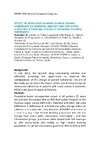Identificador persistente para citar o vincular este elemento:
https://accedacris.ulpgc.es/jspui/handle/10553/52842
| Título: | Effect of drug cost-sharing change on nonadherence to essential medications for acute coronary syndrome: a population based natural experiment | Autores/as: | González, B. Librero, J. Peña-Logobardo, L. M. Bauer, S. Garcia-Sempere, A. Puig-Junoy, J. Oliva Moreno, J. Peiro, S. Sanfelix-Gimeno, G. |
Clasificación UNESCO: | 531207 Sanidad | Palabras clave: | Gasto sanitario Economía de la salud |
Fecha de publicación: | 2016 | Publicación seriada: | Value in Health | Resumen: | Objectives: In July 2012, the Spanish drug cost-sharing scheme was reformed, providing the opportunity to evaluate the consequences of this change on patient adherence.The aim of this study was to assess the impact of the cost-sharing change on medication non- adherence in patients with acute coronary syndrome (ACS) in the Spanish region of Valencia. Methods: Population-based retrospective cohort of all patients 35 years old and over discharged after an ACS from public hospitals in the Valencia region during 2009-2011, followed until 2013.We used Difference in Difference to estimate the policy change effect on non-adherence to antiplatelet, beta-blockers, ACEI/ARB and statins of a control group –low income working popula-tion who did not change their status (40% coinsurance, unchanged)- and two inter-vention groups: pensioners (who moved from full coverage to 10% coinsurance) and middle to high income working population, for whom coinsurance grew from 40% to 50% or 60% of drug cost. Results: No significant differences in non-adherence between intervention and control groups were found for medications with low price and low patient maximum coinsurance, such as antiplatelet and beta-blockers. For ACEI/ARB and statins, the policy change had an immediate effect in the propor-tion of non-adherence in the pensioner group as compared with the control group (6.8% and 8.3% increase respectively, p<0.01 for both). Non-adherence to statins significantly increased after the reform for the middle to high income group vs. control group (7.8% increase,p<0.01).However, those effects were transitory (p<0.01 for all medications). Conclusions: Coinsurance changes may lead to increased non-adherence to proven, effective therapies, especially for higher priced agents with higher patient cost share.Adherence was already sub-optimal before the cost-sharing policy change, with a clear cost/income gradient. Consideration should be given to fully exempt high risk patients from drug cost-sharing. | URI: | https://accedacris.ulpgc.es/handle/10553/52842 | ISSN: | 1098-3015 | DOI: | 10.1016/j.jval.2016.09.1800 | Fuente: | Value In Health [ISSN 1098-3015], v. 19 (7), p. A659, (Noviembre 2016) | Derechos: | by-nc-nd |
| Colección: | Actas de congresos |
Citas de WEB OF SCIENCETM
Citations
4
actualizado el 08-jun-2025
Visitas
100
actualizado el 24-ene-2024
Descargas
88
actualizado el 24-ene-2024
Google ScholarTM
Verifica
Altmetric
Comparte
Exporta metadatos
Los elementos en ULPGC accedaCRIS están protegidos por derechos de autor con todos los derechos reservados, a menos que se indique lo contrario.
